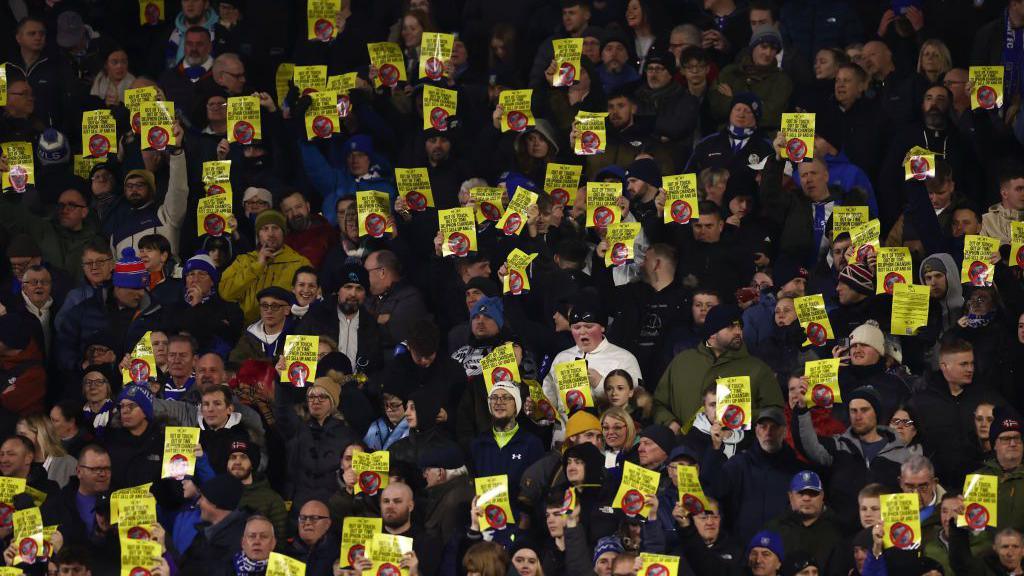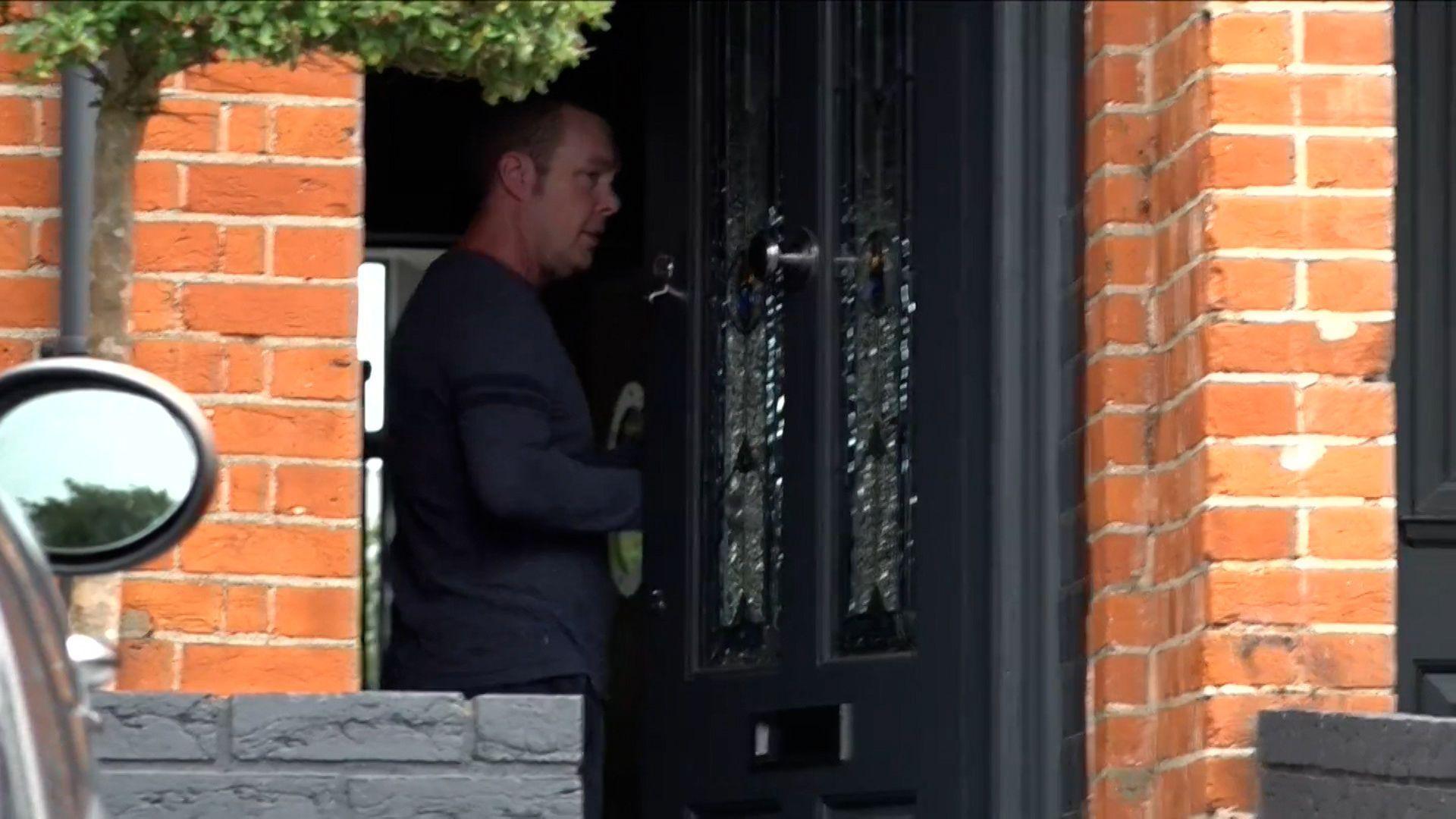Why have authorities not stepped in over Sheff Wed and Morecambe crises?
- Published
The financial turmoil enveloping Sheffield Wednesday and Morecambe has been met with anger and concern by fans of the two clubs, supporters of other teams across the country, former players, government ministers, and far beyond.
But another common reaction has been sheer bemusement.
How has all of this been allowed to happen? Why have the clubs' respective owners not simply been removed from their positions? Why have the authorities not stepped in?
The BBC has been speaking to those involved to try and find out the answers.
Debt, delays & desperation - how Sheff Wed crisis impacts fans
- Published6 August
Why haven't Sheffield Wednesday and Morecambe owners left?
The circumstances may be different, but Sheffield Wednesday owner Dejphon Chansiri and Morecambe counterpart Jason Whittingham remain in their positions because they have not agreed to sell their respective clubs.
Chansiri claimed in June he has turned down two separate offers to buy the Owls earlier this summer as they undervalued the club, while Whittingham announced an agreement to sell Morecambe to Sikh group Panjab Warriors, before reneging on the deal without explanation.
Football clubs mean an enormous amount to their communities, but are ultimately private companies, so those in charge are allowed to run them as they see fit and, from their perspective.
If that involves providing lower levels of funding than before, which in the cases of both clubs has involved delayed or outright unpaid wages to players and staff members, that is their own business decision and they cannot be removed from their position by the football authorities.
Likewise, from the perspective of each owner, they have formulated a value and a price-point for their club they expect to be met in order to agree to a sale.
How did Chansiri and Whittingham pass owners test?
Much criticism has been levelled at the fact that both Chansiri and Whittingham passed the English Football League's (EFL) owners' and directors' test when they took over their clubs, in 2015 and 2018 respectively.
The EFL operates that test process for clubs in the Championship, League One, and League Two, while the Premier League conducts a similar process for its clubs. The National League operates a test that one club owner told the BBC is less fulsome than it could and should be.
The EFL version involves an assessment of whether a potential purchaser can prove they have the funds available to buy and run the club they are targeting. Chansiri and Whittingham managed to do so at the point of purchase.
The league then monitors owners' financial pledges over time, but cannot simply force an owner's removal if spending levels plummet.
If their personal financial circumstances worsen or they decide they are no longer interested in providing the same level of financing, there is little to be done from outside beyond imposing sanctions.
In some rare cases, including where allegations of financial illegality are concerned, the EFL can disqualify and set a deadline for an owner to divest their shares in a club.
Former Reading owner Dai Yongge was disqualified earlier this year.

Sheffield Wednesday fans have been conducting regular protests against Dejphon Chansiri's ownership
Can owners not be forced out over lack of funding?
The EFL is able to charge clubs and owners over matters such as unpaid wages or failing to meet other financial obligations, which if proven typically lead to fines and/or points deductions.
There is not a mechanism to force an owner out of a club, in the same way that other kinds of business owners cannot be immediately told to sell or give up their businesses for running them poorly.
The EFL released a statement concerning Sheffield Wednesday on Thursday, saying: "We are clear that the current owner needs to either fund the club to meet its obligations or make good on his commitment to sell to a well-funded party, for fair market value - ending the current uncertainty and impasse."
The Independent Football Regulator, in its early stages of operations after being brought into law following the passing of the Football Governance Bill, could change the way that owners' behaviour is monitored.
Owners will have to operate under a licence in order to run their clubs. Poor owner behaviour could theoretically lead to that licensed being revoked, and their club being unable to operate under their stewardship, potentially leading to a kind of forced sale at what would be considered market value. But that system is not in operation yet.
Speaking to BBC Breakfast on Wednesday, Culture, Media and Sport secretary Lisa Nandy said: "There were many, many owners who were passing owners and directors test who were not fit to own the club.
"The regulator will be able to look retrospectively at whether somebody is fit and proper to own a club - and it does also allow the regulator in very extreme cases, where the club would otherwise be lost - to be able to force the owners to sell rather than the club collapsing."
Until that system is up and running, though, there is a vacuum – there are limited options to prevent owners who are not providing adequate funding for their club from doing so, whether it be by the league, the regulator, or the government.

BBC Sport approached Jason Whittingham outside his home on Monday, but he did not answer questions
How does BBC Sport approach these stories?
BBC Sport aims to find out and verify accurate information about stories such as these and then convey them to the audience in as timely a manner as possible.
That means our journalists have been in regular contact with a variety of people and bodies concerning both the Sheffield Wednesday and Morecambe crises. This includes requesting interviews and/or putting questions to the clubs, their owners, players, other staff members, the EFL, the National League, and the government.
Some parties are not always willing to speak on the record. For example, we have made multiples approaches to Morecambe owner Jason Whittingham, and approached him outside his home earlier this week, but have received no response.
A request to interview Chansiri has been rejected.
There is of course no way to compel anybody involved in stories like these to speak to the media.
But a lack of communication can lead to even greater confusion and concern for fans who are seeking assurances about the safety of the club they love.
What is Ask Me Anything?
This article is the latest from BBC Sport's Ask Me Anything team. Ask Me Anything is a service dedicated to answering your questions.
We want to reward your time by telling you things you do not know and reminding you of things you do.
The team explores everything you need to know and calls upon a network of contacts including our experts and pundits.
We answer your questions from the heart of the BBC Sport newsroom, and go behind the scenes at some of the world's biggest sporting events.
Our coverage spans the BBC Sport website, app, social media and YouTube accounts, plus BBC TV and radio.